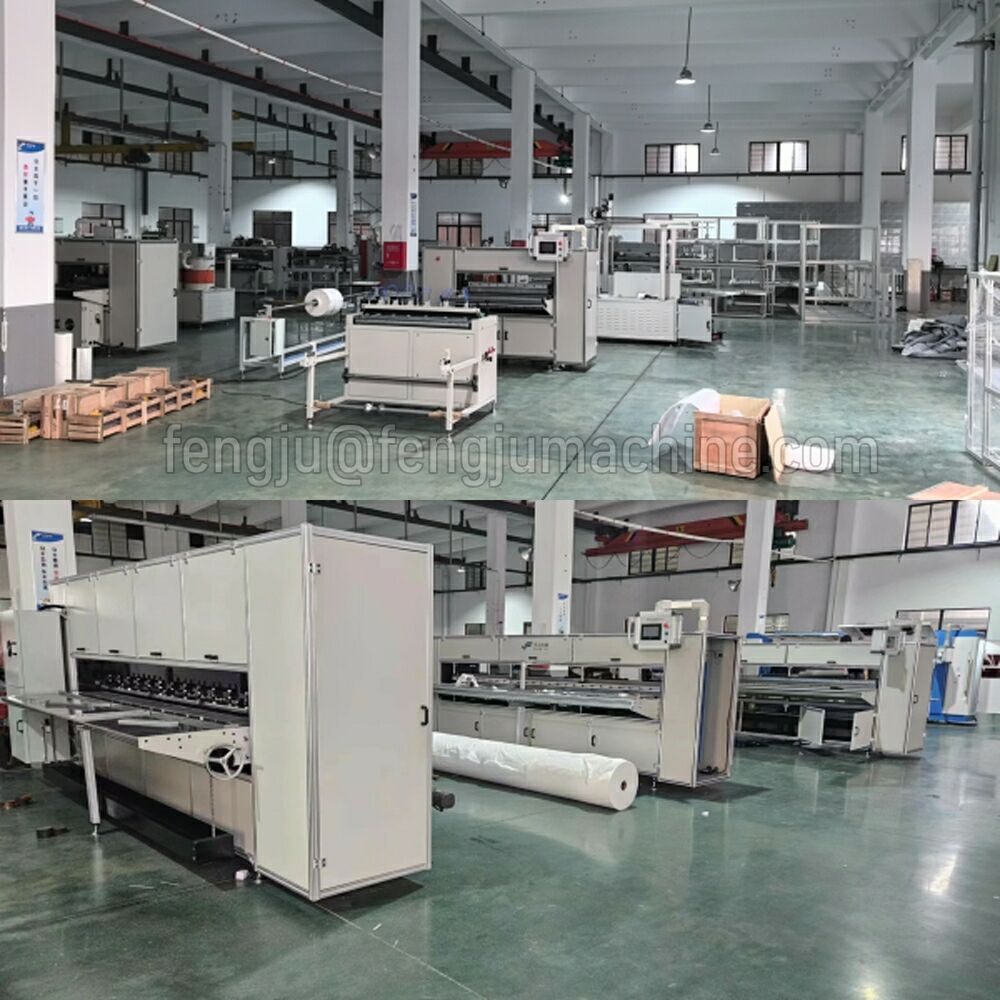Бүкіләлемдік плиссировка жабдықтары саласының ландшафтын түсіну
Тоқыма және сүзгіштік өнеркәсібі әртүрлі материалдарда дәл, біркелкі плиссирлеулер жасау үшін жоғары сапалы плиссировка станоктарына күшті тәуелді. Бүкіләлемдік жеткізу тізбегі өзгеріп, өндірістік талаптар одан әрі күрделенген сайын, сенімді плиссировка станогы өндірушісін табу маңызды мәселе болып отыр. Саланың лидерлері дұрыс өндірушіні таңдау тек бағаларды салыстырудан асып табыстың ұзақ мерзімді факторларына әсер ететін бірнеше факторларды жан-жақты бағалауды қажет ететінін мойындайды.
Фильтр өндірісінен бастап тоқыма өндіріске дейінгі салаларда дәл плиссировка шешімдеріне деген сұраныс үздіксіз өсуде, сондықтан сапалы жабдықтарды тұрақты түрде жеткізе алатын және тұрақты жеткізу тізбегін қолда алатын өндірушімен серіктестік жасау маңызды болып отыр. Жақын жылдарда әмбебап өнеркәсіптік қажеттіліктерді қанағаттандыру үшін өндірушілер мүмкіндіктерін кеңейте отырып, бүкіләлемдік плиссировка жабдықтары нарығы маңызды өзгерістерге ұшырады.
Плис құралдарын жасаушы өндірушілерді бағалаудың негізгі критерийлері
Өндіру мүмкіндіктері мен техникалық біліктілік
Плис машинасы өндірушісін бағалайтын кезде олардың өндірістік мүмкіндіктері сіздің бағалауыңыздың алдыңғы қатарында болуы тиіс. Қазіргі заманғы плистеу технологияларын айқын түсінетін, жабық өндірістік құрылымдарға ие компанияларды іздеңіз. Өндіруші нождық плис машиналарынан бастап, дамыған роторлы плис жүйелеріне дейінгі әртүрлі түрдегі плис жабдықтарын жобалау мен өндіру саласында кең тәжірибеге ие болуы тиіс.
Техникалық біліктілік тек қана машиналарды өндіруден тыс кеңейеді. Ең жақсы өндірушілер машиналардың техникалық сипаттамалары, тұлғаға лайықтандыру опциялары мен жұмыс талаптары туралы құнды ақпарат беруге қабілетті білікті инженерлер мен техниктерді қызметке алады. Олар толық техникалық құжаттаманы ұсына алуы керек және плистеу технологиясындағы жаңашылдық тәжірибесін көрсетуі тиіс.
Сапа бақылау стандарттары мен сертификаттандыру
Плиссірлеу машинасының өндірушісін таңдаған кезде сапаны қамтамасыз ету ең маңызды орын алады. Алдыңғы қатарлы өндірушілер өндірістік процестің барлық кезеңдерінде қатаң сапа бақылау протоколдарын қолданады және сәйкес салалық сертификаттарға ие болады. ISO сертификаттарын, әсіресе ISO 9001-ге назар аударыңыз — бұл сапа басқару жүйелеріне деген салымның көрсеткіші.
Сонымен қатар, өндірушілер жеткізу алдында жабдықтарын қатаң сынақтан өткізуі тиіс, оған жұмыс істеу сынамалары мен сапа тексерулері қосылады. Осы сапа процестері мен сынақ нәтижелері туралы құжаттама сұрау бойынша тез арада қолжетімді болуы тиіс.
Жеткізу тізбегінің сенімділігі мен әлемдік қамтылуы
Дұрыс өндірістік жобалау шеберлігі
Жабдықты сенімді түрде жеткізу мен үздіксіз қолдауды қамтамасыз ету үшін әлемдік масштабтағы тарату желісі өте маңызды. Алдыңғы қатарлы плиссірлеу машиналарының өндірушілері әлемнің түпкілікті нүктелерінде стратегиялық серіктестіктерге ие болады. Бұл желі әр түрлі аймақтарда тиімді жөнелтуді, салық рәсімдерін және жергілікті қолдау қызметтерін қамтамасыз етуі тиіс.
Экспорттық реттеулер мен құжаттама бойынша тәжірибелерін қоса алғанда, халықаралық транзакциялармен жұмыс істеу қабілетін бағалаңыз. Олардың глобалдық ұсынысына қажет болған кезде дереу көмек көрсетуі мүмкін болатын жергілікті өкілдері немесе серіктестері енуі тиіс.
Компоненттерді табу және қоймадағы тауар қорын басқару
Сенімді өндірушілер компоненттер құрастырушыларымен мықты қарым-қатынастар орнатып, қоймадағы тауар қорын тиімді басқару жүйелерін енгізеді. Бұл тұрақты өндіріс кестесін қамтамасыз етеді және болуы мүмкін кешігулерді минималдандырады. Маңызды компоненттерді табу тәсілін және тізбектік жеткізу бұзылымдарын басқарудың стратегияларын зерттеңіз.
Жеткілікті ауыстырып-қосатын бөлшектер қорын сақтайтын және машиналардың күтілетін өмірлік циклына қол жеткізілетінін кепілдік беретін өндірушілерді іздеңіз. Жабдықтардың өнімділігін сақтау мен тоқтап тұру уақытын азайту үшін ұзақ мерзімді қолдауға берілген бұл міндеттілік маңызды.
Қызметкерлердің қолдауы мен соңғы қызметтер
Техникалық қолдау инфраструктура
Машиналардың жұмыс істеуін ең жоғары деңгейде ұстау үшін толық техникалық қолдау маңызды. Алдыңғы шайқаларды жасаушы компаниялар қашықтан көмек, нарықтағы қызмет және ретті техникалық қызмет көрсету бағдарламалары сияқты бірнеше қолдау каналдарын ұсынады. Олардың техникалық қолдау тобына оңай қол жеткізуге болуы керек және қарапайым да, күрделі де мәселелерді шеше алуы тиіс.
Операторлар мен техникалық қызмет көрсету қызметкерлері үшін даярлау бағдарламалары өндірушінің қызмет көрсету ұсынысының бөлігі болуы керек. Бұл машиналарды дұрыс пайдалануға кепілдік береді және дұрыс емес пайдалану немесе техникалық қызмет көрсету әдістерінен туындайтын мәселелерді болдырмауға көмектеседі.
Кепілдеме және қызмет келісімдері
Өндірушінің кепілдеме шарттарын және қолжетімді қызмет келісімдерін мұқият қараңыз. Алдыңғы қатарлы өндірушілер өз жабдықтарын толық кепілдемемен қамтамасыз етеді және әртүрлі жұмыс істеу қажеттіліктеріне сәйкес келетін икемді қызмет көрсету жоспарларын ұсынады. Шарттарда бөлшектерге, еңбекке және кепілдеме талаптарына әсер етуі мүмкін жағдайларға қатысты нақты ақпарат берілуі тиіс.
Ұзақ кепілдік опциялары мен алдын ала техникалық қызмет келісімдерінің болуын қарастырыңыз. Бұл қосымша сенімділік бере алады және ұзақ мерзімді техникалық қызмет көрсету шығындарын тиімді басқаруға көмектеседі.
Қаржылық тұрақтылық және бизнес репутациясы
Компанияның тарихы мен нарықтағы орны
Өндірушінің қаржылық тұрақтылығы мен нарықтағы репутациясы олардың сенімділігінің маңызды көрсеткіштері болып табылады. Істеген жылдарың, нарықтық үлесі мен саладағы танылуын қамтитын бизнес-тарихын зерттеңіз. Тұрақты өсу мен зерттеу және дамытуға инвестиция салуға дәлелдерді іздеңіз.
Тұтынушылардың пікірлері мен мысалдар негізінде зерттеулер өндірушінің жұмыс істеуі мен сенімділігі туралы бағалы ақпарат беруі мүмкін. Ірі масштабты жобалармен жұмыс істеу тәжірибесіне және жеткізу міндеттемелерін уақытылы орындау қабілетіне назар аударыңыз.
Инновация мен дамытуға салымдар
Алдыңғы орама машиналарын шығаратын компаниялар үздіксіз зерттеу және дамыту жұмыстары арқылы инновацияға деген ынталылықтарын көрсетеді. Оған жаңа технологияларды әзірлеу, бар дизайндарды жетілдіру және пайда болып жатқан салалық тенденцияларға бейімделу кіреді. Олардың соңғы технологиялық жетістіктерін және болашақтағы инновацияларға деген көзқарастарын қарастырыңыз.
Қазіргі заманғы өндірістік құрылымдар мен сандық технологияларға салымдарын бағалаңыз. Бұл олардың бәсекеге қабілеттілігін сақтауына және өзгеріп отыратын нарықтық талаптарға сай келу қабілетіне куә болады.
Жиі қойылатын сұрақтар
Орама машиналарының кепілдік шарттарын салыстырғанда нені ескеруім керек?
Кепілдік шарттарын бағалай отырып, қамтитын мерзіміне, қосылған компоненттерге, қызмет көрсету уақытына және шектеулерге назар аударыңыз. Қалыпты және кеңейтілген кепілдік опцияларының құны мен пайдасының қатынасын салыстырыңыз және шарттардың сіздің жұмыс талаптарыңыз бен техникалық қызмет көрсету мүмкіндіктеріңізге сәйкес келетінін тексеріңіз.
Глобалдық өндірушіні таңдағанда жергілікті қолдау қаншалықты маңызды?
Тоқтап қалуды азайту және техникалық мәселелерге жедел реакция жасау үшін жергілікті қолдау маңызды. Тікелей немесе уәкілетті серіктестер арқылы өндірушінің жергілікті болуы машиналардың техникалық қызмет көрсетуіне, ауыстыру бөлшектерінің қолжетімділігіне және жалпы операциялық тиімділікке едәуір әсер етуі мүмкін.
Өндірушіні таңдау кезінде тұтынушыға лайықтау мүмкіндігі қандай рөл атқарады?
Нақты өндірістік талаптар мен материалдарды тасымалдау қажеттіліктерін шешу үшін тұтынушыға лайықтау мүмкіндігі маңызды. Өндіруші әртүрлі қолданыс салаларына жабдықтарын икемдеуге икемділік танытса да, орындалу стандарттары мен сапа бақылауын сақтауы керек.
Өндірушінің жеткізу тізбегінің сенімділігін қалай тексеруге болады?
Уақытылы жеткізу тарихын, бар клиенттерден алынған пікірлерді және жеткізу тізбегіндегі үзілістерді басқару стратегияларын бағалаңыз. Жеткізуші желісі, қоймадағы тауар қорын басқару тәжірибелері және жеткізу тізбегімен байланысты потенциалды қиындықтарды шешу бойынша іс-шаралар туралы ақпарат сұраңыз.

